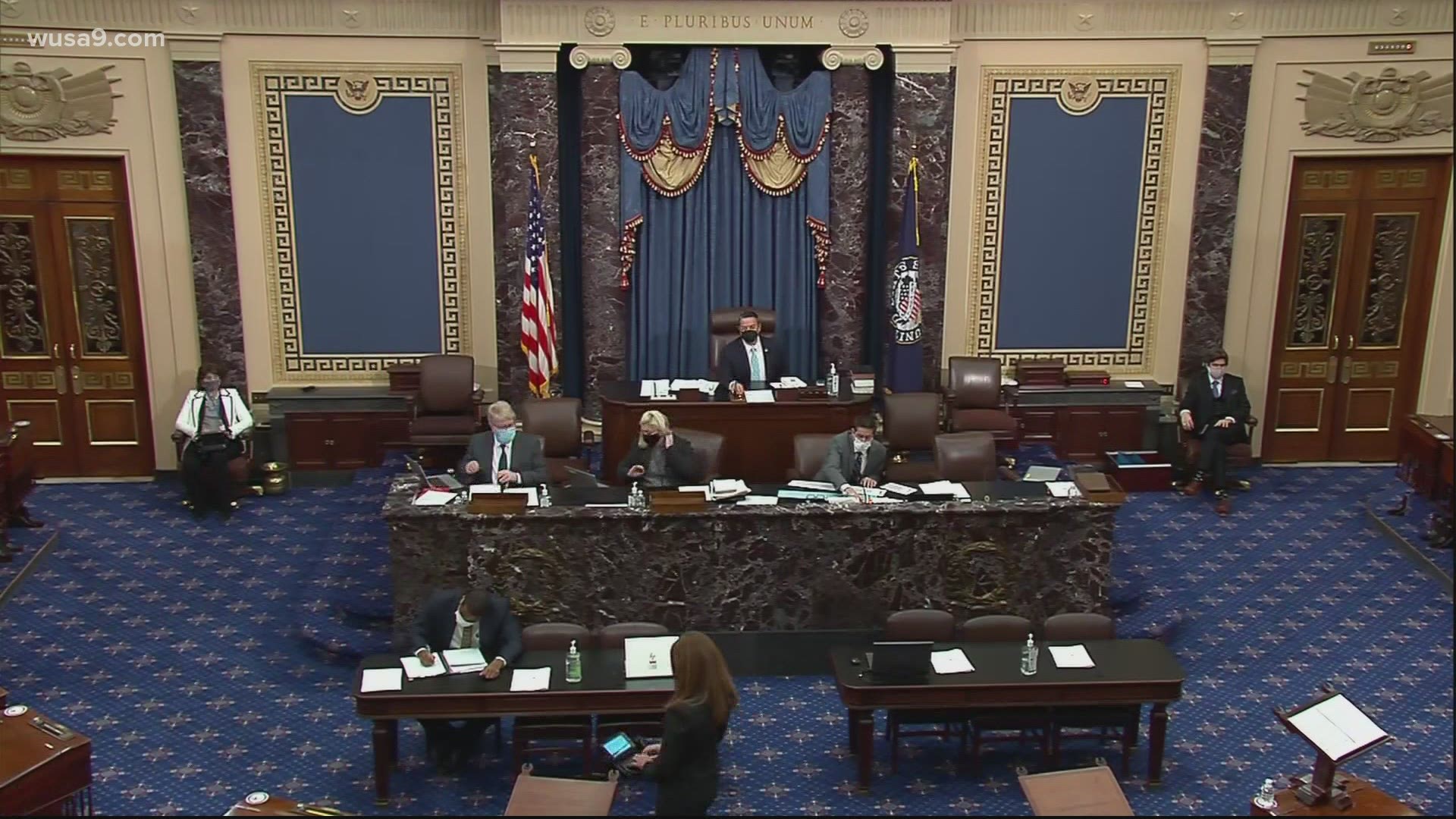WASHINGTON — A D.C. Statehood Bill pushing for the District to become the 51st state was reintroduced in the Senate Wednesday, officially marking the beginning of the race to push the legislation through the new Congress.
The legislation, first introduced in 2013 was reintroduced by Sen. Tom Carper (D-Del.) There are 38 cosponsors -- all Democrats -- signed onto the bill.
S. 51, the "Washington, D.C. Admissions Act", not only pushes for statehood but would allow the people of D.C. and elected leaders to have full authority over local affairs, and full representation in Congress.
WUSA9's Adam Longo asked a colleague in the White House briefing room to pose a question about D.C. Statehood to Press Secretary Jen Psaki. She deferred but followed up the next day by saying, "The President has supported D.C. statehood in the past; that certainly remains his position."
With a D.C. statehood bill now in the Senate and another version in the House, the question becomes how soon will leaders in each body push for committee hearings? D.C. Mayor Muriel Bowser wants a DC Statehood bill on President Biden's desk within the first 100 days of his term.
"If racial equity and racial justice is a big part of what he wants to focus on within the first 100 days that has to be D.C. statehood," Jamal Holtz of the statehood advocacy group 51 for 51 -- as in 51 Senators voting 'yes' for the 51st state -- said. "If you support statehood and support giving 700,000 residents the right to their democracy, then you should support any path that will take us to get there. And if you don't you're literally in the way of giving us our right to democracy."
"Things are proceeding quickly," D.C.'s non-voting Shadow Senator Paul Strauss said. "We've never had the bill introduced this early. So a lot of Senators are heeding the mayor's call."
The Senate version of the D.C. Statehood bill is likely going to need the support of every single Democrat, unless a Republican were to cross the aisle and support it. Strauss said Joe Manchin (D-WV) isn't on board -- right now.
"I've had some very encouraging conversations with Senator Manchin's team. And I look forward to being able to educate him further," Strauss said.
There are, at this point, two major hurdles in advancing S.51 through the Senate. First, the bill is assigned to the Senate's Homeland Security and Government Affairs committee. Because of the 50-50 split between Democrats and Republicans, the DC Statehood bill would need every Democrat to vote yes to advance the bill out of committee.
Majority Leader Chuck Schumer has yet to announce committee assignments, but there's no guarantee every Democrat on the committee would support advancing the bill.
Secondly, the legislative filibuster requires that 60 votes be necessary to close debate on an issue and advance to a vote. Only if the filibuster is scrapped or if 10 Republicans voted to close debate, could D.C. statehood get a vote on the floor of the Senate; both possibilities seem very unlikely at this point.
House Speaker Nancy Pelosi issued a statement on Jan. 4 that Congress will bring the measure on D.C. statehood to a full vote in the House of Representatives this year.
Read Sen. Carper's full statement below:
“Our nation’s capital is home to more than 700,000 Americans who, despite our nation’s founding mantra — ‘no taxation without representation’ — pay their share of taxes without full voting representation in either chamber of Congress. In fact, despite paying more in federal taxes per capita than citizens of any of the 50 states, D.C. residents have no say in how those taxes are actually spent. This isn’t a Republican or Democratic issue; it’s an American issue because the lack of fair representation for D.C. residents is clearly inconsistent with the values on which this country was founded.
It is therefore incumbent upon all of us who enjoy the right and the privilege of full voting rights and representation to take up the cause of our fellow citizens in the District of Columbia. We must use our voices to call out this historic injustice and right this wrong. I am hopeful that we can finally come together to do just that this Congress,” said Senator Carper. “I want to thank Congresswoman Norton and Mayor Bowser for their steadfast leadership and partnership on this issue. I’m proud to be introducing this bill this Congress with the highest number of original cosponsors we have ever received and with the support of all the Senators who represent the communities that make up the greater Washington metro area in Maryland and Virginia.”
Following the swing in power to the Democrats, combined with the flaws that led to the Capitol riots on January 6, the push for DC statehood has never been stronger.
Under federal law, the president controls the D.C. National Guard, while the governors of the states and territories control their National Guards. Under the Home Rule Act, the president has the authority to federalize the D.C. police department. And during the riots, it took longer to deploy D.C. National Guard because approval goes through federal leaders rather than D.C. Government.
Proponents of D.C. statehood came closer than ever before in 2020. In February, HR 51 passed on party lines out of the House Oversight Committee. And in June, House Majority Leader Steny Hoyer (D-MD) brought the gavel down after approval of the historic vote on the House floor which sought to establish Washington, Douglass Commonwealth as the 51st state of the United States. It ultimately failed in the Republican-controlled Senate.


